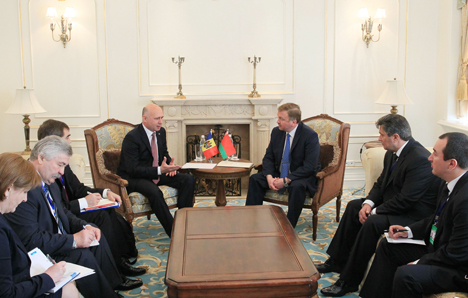Opinions & Interviews
Kobyakov: Belarus, Moldova have the opportunity to shift from simple trade to cooperation

BISHKEK, 7 June (BelTA) – Belarus and Moldova have every chance of shifting from simple trade to the implementation of investment projects, Belarus’ Prime Minister Andrei Kobyakov said as he met with his Moldovan counterpart Pavel Filip on the sidelines of the meeting of the CIS Heads of Government Council in Kyrgyzstan on 7 June, BelTA has learned.
“I think our today’s meeting will help address the issues we have and support our economic entities in shifting from simple trade in goods to the implementation of investment projects. We can trade in the Eurasian Economic Union, you - in the European Union. We should make use of these opportunities. We invite you to a productive dialogue on a whole range of mutual relations,” said Andrei Kobyakov.
Andrei Kobyakov stressed that Belarus and Moldova enjoy close ties. The countries continue developing trade and economic relations despite a difficult economic situation in the world. “You President pay an important visit to Belarus last year,” the Prime Minister said.
 Pavel Filip, for his part, thanked Belarus for a well-balanced and constructive approach to Moldova’s European integration choice. “Common interests can always been found. I think the relations the two countries established prove that we do not hamper each other, we complement each other,” he said.
Pavel Filip, for his part, thanked Belarus for a well-balanced and constructive approach to Moldova’s European integration choice. “Common interests can always been found. I think the relations the two countries established prove that we do not hamper each other, we complement each other,” he said.
The agenda of the meeting includes more than 10 issues that cover a wide range of important cooperation areas. Special attention will be attached to the development of trade and economic cooperation, joint work in the energy and healthcare sectors, enhancement of food security and the implementation of the innovative cooperation program. Participants of the meeting will take stock of the progress made in the implementation of the interstate innovative cooperation program in 2015 and the action plan for 2015-2016 on the implementation of the interstate innovative cooperation program (both the documents are valid through 2020). Participants of the meeting are expected to sign a protocol between the member states of the CIS Free Trade Zone Agreement (of 18 October 2011) on the regulation of public procurement, the convention to preserve agro biodiversity. They are also set to approve the CIS population health strategy, sign the agreements on sharing information about accidents at power facilities, information cooperation on the transportation of radioactive sources, and adopt the concept of cooperation in chemical industry.







 print version
print version make home page
make home page add to bookmarks
add to bookmarks

